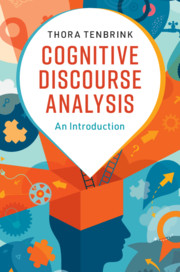Book contents
- Cognitive Discourse Analysis
- Cognitive Discourse Analysis
- Copyright page
- Contents
- Figures
- Tables
- Preface
- Acknowledgements
- Introduction
- 1 Background and Scope
- 2 Language as a Representation of Thought
- 3 Resources
- 4 Identifying Cognitive Orientation
- 5 Identifying Cognitive Depth
- 6 Identifying Cognitive Constructiveness
- 7 Using Language to Convey Thoughts
- 8 CODA Procedures
- 9 Beyond CODA
- Register of Linguistic Features
- References
- Index
8 - CODA Procedures
Published online by Cambridge University Press: 23 January 2020
- Cognitive Discourse Analysis
- Cognitive Discourse Analysis
- Copyright page
- Contents
- Figures
- Tables
- Preface
- Acknowledgements
- Introduction
- 1 Background and Scope
- 2 Language as a Representation of Thought
- 3 Resources
- 4 Identifying Cognitive Orientation
- 5 Identifying Cognitive Depth
- 6 Identifying Cognitive Constructiveness
- 7 Using Language to Convey Thoughts
- 8 CODA Procedures
- 9 Beyond CODA
- Register of Linguistic Features
- References
- Index
Summary
Chapter 8 provides a detailed account of practical steps and advice for doing CODA. While avoiding reintroducing well-known methods of discourse analysis , it highlights important principles and shares practice–based insights that have accumulated over many years of doing CODA. Starting with considerations as to the purpose of individual CODA studies, it discusses relevant procedures step by step, including experimental design aspects, data collection, transcription and data preparation, and practical steps of data analysis such as segmentation, content analysis, tool support, and operationalisation of analysis categories. The final sections of this chapter consider issues pertaining to qualitative and quantitative analysis methods. The practical guidance using only simple and highly accessible tools provided in this chapter will be well received particularly by graduate students (or early-career researchers) with little access to complex technologies or hands–on practical support in their own universities. More experienced researchers will understand the principles quickly and be able to adapt them for their own purposes, using whichever technology they may have access to.
Keywords
Information
- Type
- Chapter
- Information
- Cognitive Discourse AnalysisAn Introduction, pp. 194 - 225Publisher: Cambridge University PressPrint publication year: 2020
